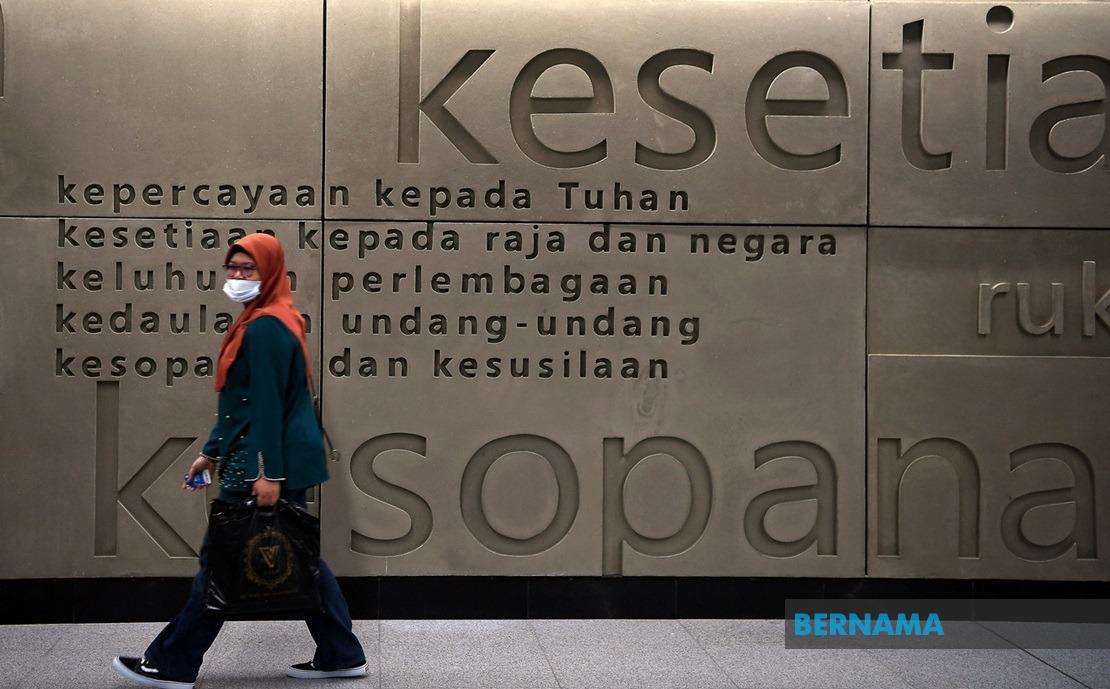
By Hamdan Ismail
KUCHING, Sept 8 -- Listening to Tan Sri Leonard Linggi Jugah talk about the formulation of the Rukun Negara is like flipping through the pages of a history book.
The 80-year-old retired Sarawak minister still recalls vividly the significant moments in the drawing up of the National Philosophy that has been a guide for Malaysians over the past 50 years.
“I was only 30 years old (then). There were people like (Universiti Malaya former vice-chancellor Prof) Syed Hussein Al-Attas and other academic professors. I tell you, it was an incredible session. It was really educational for me to listen to them explaining the various concepts,” he said.
Leonard Linggi was the only Sarawakian in the National Consultative Committee (NCC), which held its first meeting on March 31, 1970.
“I was a member of the National Consultative Committee representing (Sarawak second chief minister) Datuk Tawi Sli’s government at that time,” he said in an interview for a special Bernama documentary, Rukun Negara: A Nation United.
The two-episode documentary was produced by Bernama in conjunction with the Rukun Negara Golden Jubilee for broadcast between Aug 31 and Sept 19 by BernamaTV on Channel 502 ASTRO, Njoi 502, UnifiTV 631 and MyFreeView 121, as well as BernamaTV's official Facebook page and YouTube channel.
The Rukun Negara was drawn up in the aftermath of the racial riots of May 13, 1969, to strengthen unity in the country.
Leonard Linggi said that though the racial conflict was confined to certain states in Peninsular Malaysia at that time, the effect of the tragedy was very much felt throughout the country and required a concerted effort from all quarters to ensure that it would not recur.
“The idea to form the NCC was to find ways and means to unite and bind our people for the sake of unity and prosperity. The idea was to think of a philosophy that can be easily taken in by our people irrespective of their race or religion, and culture,” he explained.
Leonard Linggi said inter-racial relationship is not so much of an issue in Sarawak.
He said that on numerous occasions, Sarawak had been referred as a model for people in the rest of the country for its success in maintaining unity among its diverse ethnic communities.
Due to this “built-in” nature of Sarawakians, he said, they have no problem of embracing the five principles of the Rukun Negara, namely Belief in God; Loyalty to King and Country; Upholding the Constitution; Rule of Law; and Good Behaviour and Morality.
"Part of these (tenets) have been practised in Sarawak for a long, long time. For example, mutual respect and good social behaviour … anywhere in Sarawak, whether it is in Kuching, Lubok Antu, Kapit, or Belaga, the people do mingle with one another.
"We have the Malays, Chinese and Ibans. We have more or less the same proportion (of racial breakdown in Sarawak). There is no question of one (race) dominating another in terms of numbers," he said.
As it has been half a century that the Rukun Negara has become an integral part of nation-building in Malaysia, Leonard Linggi felt that efforts ought to be continuous in maintaining the awareness of its importance, especially among the younger generation of Malaysians.
Leonard Linggi now looks back proudly on the success of the NCC in having restored stability in the country by introducing the Rukun Negara which, he said, is vital for all Malaysians to appreciate.
Regardless of how much progress Malaysia has enjoyed since gaining independence, unity among its diverse community remains an important element that has to be safeguarded at all times, he said.
“The concept (of Rukun Negara) is applicable (whether it is) in the 1970s or 2020. Modern Malaysians want justice, fair play, transparency; this is where not only you and I but our authorities, our government, their agencies, NGOs, everybody must play a part,” he said.
Leonard Linggi, in his numerous public presentations on the Rukun Negara, used to cite an example of a suspension bridge built across a small stream in a village to drive his message across.
“Normally it (the village suspension bridge) would be made of bamboo. If you walk on it, it will wobble. The railings you hold on to are (like) the Rukun Negara in our journey to unity that guides us the right way to reach our destination,” he said.
-- BERNAMA
TENTANG KAMI
Pertubuhan Berita Nasional Malaysia
Wisma BERNAMA
No.28 Jalan BERNAMA
Off Jalan Tun Razak
50400 Kuala Lumpur
Malaysia
Tel : +603-2693 9933 (Talian Am)
Email : helpdesk@bernama.com
Kategori
• Am
• Ekonomi
• Sukan
• Politik
• Dunia
• Rencana
• Tinta Minda
• Infografik
• Video
• Images
• Siaran Media Eksklusif
Hak Cipta
